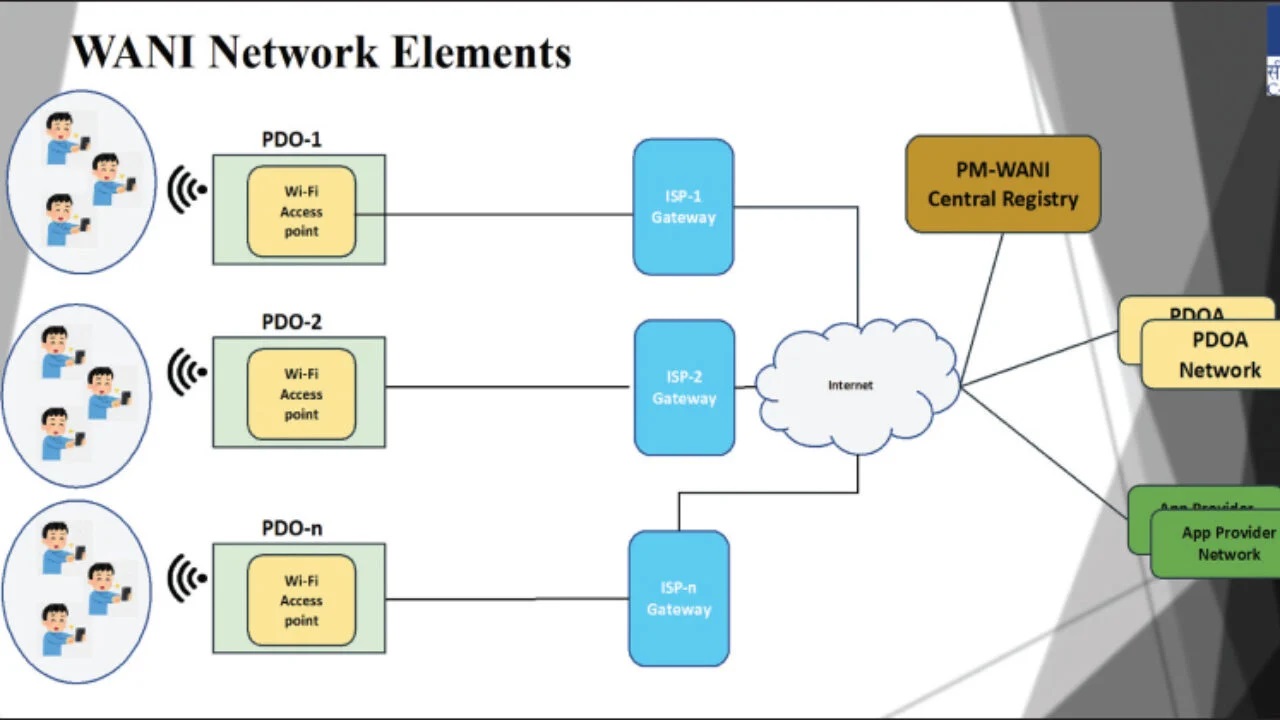PM-WANI
Internet distributed through PMWANI can be a game changer in digital connectivity.
India’s per capita data consumption is 19.5 GB per month.
- PM - Wi-Fi Access Network Interface (PM-WANI) was launched by the Department of Telecommunication (DoT) in December 2020.
- Aim - To enhance the proliferation of public Wi-Fi hotspots to create robust digital communications infrastructure in the country, especially in rural areas.
- Implementation - DOT will assist all the stakeholders in implementation and proliferation of PM WANI.
- Elements - Various entities such as PDO, PDOA, app providers, and a central registry are parts of the scheme.
- The Central Registry maintains the details of the App providers, PDOAs and POAs.
- The Public Data Office Aggregators (PDOAs) provide public Wi-Fi services through PDOs spread across length and breadth of the country.
- PDOAs provides aggregate services such as authorization and accounting to PDOs.
- Public Data Offices (PDOs) (last-mile providers) can be found in small shops, local establishments, and even households.
- PDOs establish, maintain, and operate PM-WANI compliant Wi-Fi Hotspots.
- No licence or permit is needed for operators to start operations.
- App Provider will develop an Application to register users and discover and display PM-WANI compliant Wi-Fi Hotspots.
- Data PM-WANI App is the PM-WANI compliant app which help users to easily navigate and discovering PMWANI Wi-Fi hotspots.

- Benefits - PM-WANI accelerates high-speed unlimited internet penetration, bridging the digital divide and empowering communities.
- It nurture the growth of local nano entrepreneurs throughout the country.
|
Main vision areas of Digital India programme
- Digital connectivity
- Software and services on demand
- Digital empowerment of citizens
|
References
IE - Wi-fi hotspot pouches: Internet from a sachet
PM - WANI - Official Website
Minimum Guaranteed Income
The Rajasthan state Assembly passed ‘The Minimum Guaranteed Income Bill’ recently.
- The bill made Rajasthan, the first state in the country to enact an urban employment guarantee law.
- Under this Bill, ‘Every adult person residing in the urban areas of the State shall have a right to guaranteed employment for doing permissible work of at least 125 days in a financial year and to receive minimum wages’.
- Since it is a right on a citizen, he or she can go to a court of law to seek its implementation.
- The bill provides ‘minimum guaranteed income’ and not the ‘minimum income guarantee’.
- The ‘minimum guaranteed income’ is either by way of cash (Rs 1,000 per month) or through employment (Rs 255 per day for a maximum of 125 days) to all the adults living in the state.
|
Minimum Guaranteed Income
|
Minimum Income Guarantee
|
|
The ‘minimum guaranteed income’ is just the minimum money the state is guaranteeing to all without claiming that this is good enough for living.
|
A ‘minimum income guarantee’ (UBI) would refer to a sum of money that the government believes is good enough for any citizen to live off.
|
Universal Basic Income (UBI)
- In UBI, the government takes away all existing subsidies and replaces them with a single cash payout to all citizens regardless of what they do and how much they earn.
References
IE - Making sense of Rajasthan’s Minimum Guaranteed Income Bill
Oriental white-backed vulture
India’s tiger reserves and other wild spaces give conservationists hope that the captive-bred the Oriental white-backed vulture will thrive again.
- Oriental white-backed vulture (Gyps bengalensis) is also known as White-rumped vulture.
- They have blackish plumage, a white neck-ruff, and a white patch of feathers on the lower back and upper tail.

- Habitat - Forest, Savanna, Shrubland and Grassland.
- Distribution - Bangladesh, Bhutan, Cambodia, India, Myanmar, Nepal and Pakistan.
- Threat - Veterinary drugs Aceclofenac and Ketoprofen
- Conservation status
|
IUCN status
|
Critically Endangered
|
|
CITES
|
Appendix II
|
- Conservation Efforts - In 2020, 8 captive-bred White-rumped vultures were released into the wild for the first time ever in India from the JCBC in Pinjore, Haryana.
- After that, 31 Oriental white-backed vultures were released in batches in West Bengal in 2021.
- The BNHS and Royal Society for Protection of Birds (RSPB) have been managing 4 JCBCs in partnership with the State governments of Haryana, Madhya Pradesh, West Bengal, and Assam.
Jatayu Conservation Breeding Centre
- The Jatayu Conservation Breeding Centre (JCBC) is a joint project of the Haryana Forest Department and the Bombay Natural History Society (BNHS).
- The centre is spread on a 5 acre land of Haryana Forest Department.
- It is located at village Jodhpur on the edge of the Bir Shikargaha Wildlife Sanctuary.
- It is a collaborative initiative to save the 3 species of vultures from looming extinction.
- The 3 species of Vultures are - White-backed, Long-billed and Slender-billed.
References
The Hindu - Captive-bred vultures flying high in forest expanses
Haryana Forest Department - Jatayu Conservation Breeding Centre
CBDC transactions through UPI QR
Recently, RBI has allowed interoperability to customers to use UPI QR codes for CBDC transactions.
- The Central Bank Digital Currency (CBDC) is digital form of fiat cash.
- E-Re or CBDC was issued by the Reserve Bank of India (RBI).
- RBI launched wholesale and retail e-Re in 2022 on after the other.
- More banks are increasingly offering e-Re wallets to customers.
- The wholesale adoption of e-Re is limited to settlement of secondary market G-Sec transactions.
- The retail e-Re was poised to be a replacement to the physical currency, though within a limited user group.
- Working - At the merchant-end, e-Re works on the QR scanning mechanism, just like UPI.
- However, the QR for e-Re and UPI are different.
- At present, UPI and e-Re require two different POS.
- With interoperability, the same POS can be made available for both modes.
- It also improves adoption of e-Re.
- Front-end - The QRs will be converged through inter-operability.
- The same QR code can be used as point-of-sales (POS) for e-Re and UPI payments.
- Back-end - RBI is taking efforts to converge payments at the back-end as well.
- A customer making a payment through UPI can be credited to the e-Re account of the merchant and vice-versa.
References
Business Line - How will CBDC transactions through UPI QR code work?
Controlled Human Infection Studies
India has taken its first step to introduce Controlled Human Infection Studies (CHIS) for vaccine and treatment development.
- Controlled human infection studies (CHIS) is a research model used in vaccine development for human infectious diseases.
- In this research model, healthy volunteers are intentionally exposed to pathogens in a controlled environment.
- This model is followed to promote understanding of the pathogenesis, transmission, prevention and treatment of infectious diseases in humans.
- Issues - Deliberate harm, possible disproportionate payment and hence inducements, third-party risk, withdrawal from the study and research with vulnerable participants.
- Advantages - CHIS uses smaller sample sizes in comparison to large clinical trials.
- It also offers accelerated, cost-effective, and efficient outcomes.
- The unique insights into disease pathogenesis it provides can accelerate the development of novel medical interventions.
- Limitations - CHIS is a highly complex area.
- It may require collaborations at different levels between researchers, institutions, organisations and/or between different countries.
- Indian Measures - The model has been used in many countries for vaccine and treatment development outside of India.
- India has so far stayed away from CHIS because of its ethical sensitivity and ethical concerns.
- ICMR Bioethics Unit has formulated a consensus policy statement to address the ethical concerns related to the conduct of Controlled Human Infection Studies in India.
Infectious diseases contribute about 30% of the disease burden in India.
References
The Hindu - India takes its first step towards opening door to CHIS
ICMR - Consensus policy statement for the ethical conduct of CHIS in India 2023

